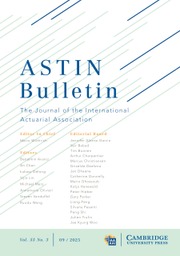Article contents
Tax-Deductible Pre-Event Catastrophe Loss Reserves: The Case of Florida1
Published online by Cambridge University Press: 17 April 2015
Abstract
After Hurricane Andrew the U.S. Congress entertained proposals to allow insurers to employ tax-deferred loss reserves. Interest was strong at first, but as the events receded interest waned. However, after the most recent severe hurricane seasons the proposals are again being discussed. In this paper we examine the institution of catastrophe loss reserves in a stylized model of insurance provisions. First, we find that the benefits of the tax-deferred loss reserves depend on the actuarial assumptions regarding the expected loss distribution. Second, we make the first attempt at estimating the change in consumer behavior and the social welfare implications for permitting tax deferred loss reserves. In sum, we find under specific circumstances there are large welfare gains for allowing the tax deferral of reserves.
Keywords
- Type
- Articles
- Information
- Copyright
- Copyright © ASTIN Bulletin 2008
Footnotes
We would like to thank Sam Cox for suggestions on actuarial methodology. We would also like to thank Richard Derrig, Richard Phillips and Tyler Leverty for comments and assistance on an earlier version of the paper and further acknowledge the prompt and valuable help of Mr. Edward N. Trevelyan of the U.S. Census Bureau. Finally, we would like to thank an anonymous referee for his/her insightful comments. All errors or omissions, however, are the authors’ responsibility.
References
- 7
- Cited by


